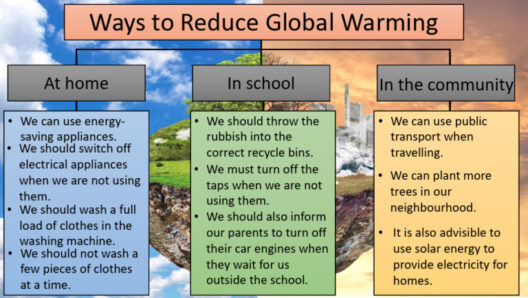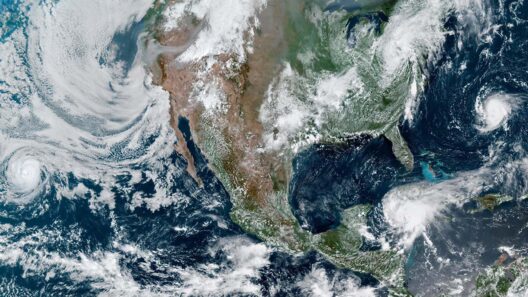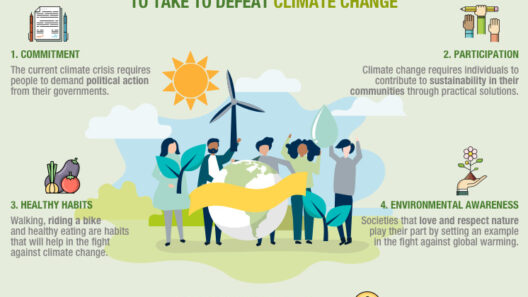What if we could transform the relentless march of climate change into an opportunity for innovation and collaboration? This tantalizing question leads us to the heart of environmental advocacy, urging us to explore the myriad ways we can combat this global crisis through science, policy, and individual actions. Climate change presents an immense challenge that transcends borders, cultures, and socioeconomic statuses. Yet, within this daunting reality lies the potential for profound change, contingent on our collective efforts.
At the scientific forefront, an array of research initiatives is redefining our understanding of climate dynamics and exploring innovative solutions to mitigate adverse effects. Scientists study atmospheric conditions, oceanic currents, and biodiversity to unravel the complex web of climate interactions. Breakthroughs in renewable energy technologies, such as solar, wind, and geothermal, promise to diminish our reliance on fossil fuels, a principal driver of greenhouse gas emissions. Not only do these alternatives reduce emissions, but they also inspire economic growth through job creation in new sectors.
Nevertheless, the transition to renewable energy is not solely a scientific endeavor; it requires robust policy frameworks. Policymakers play a pivotal role in managing resources and enacting regulations that promote sustainability. What if national governments truly embraced long-term environmental policies? This shift could be instrumental in facilitating the large-scale adoption of green technologies. For instance, initiatives like carbon pricing incentivize businesses to reduce their emissions by attaching a financial cost to carbon output. When companies perceive a tangible financial benefit from reducing their carbon footprint, genuine transformations can ensue, aligning economic incentives with environmental responsibility.
International treaties, such as the Paris Agreement, underscore the necessity of cooperation among nations in addressing climate change. These agreements set ambitious targets for emissions reductions, fostering a culture of accountability, and shared responsibility. Imagine the potential of global coalitions that prioritize climate resilience and sustainability over short-term economic gains. Enhanced cooperation allows nations to share knowledge, technology, and resources, creating a unified front against the existential threat of climate change.
In addition to global and national actions, individuals can be catalysts for change within their communities. Each person’s choices—ranging from energy consumption to waste management—can contribute to a larger movement towards sustainability. Have you ever considered how your dietary habits impact the environment? The agricultural sector is a significant contributor to greenhouse gas emissions, with livestock farming alone accounting for a substantial portion. Choosing a plant-based diet, even partially, can significantly mitigate one’s carbon footprint and promote sustainable farming practices. Engaging in local food systems not only strengthens community ties but also reduces transportation-related emissions.
Transportation is another avenue where individuals can exert influence. The proliferation of electric vehicles (EVs) presents a compelling option, yet the effectiveness of this transition depends on sustainable energy sources powering the grid. Thus, advocating for and investing in public transit, biking infrastructure, and accessible alternative transport can redefine urban mobility while supporting sustainability. Every bicycle ride taken instead of a car trip reduces congestion and emissions, exemplifying how small changes yield significant impacts.
Additionally, civic engagement is paramount in driving systemic change. When communities unite to advocate for sustainable policies, they can compel local governments to take action. Attend community meetings, engage with local representatives, and champion initiatives like urban green spaces, renewable energy projects, or comprehensive recycling programs. Such grassroots movements have the potential to persuade policymakers to prioritize ecological integrity within their agendas. Imagine what could be achieved if every citizen made climate advocacy a fundamental aspect of civic duty!
Education, too, is a powerful tool in the fight against climate change. By fostering awareness and understanding of ecological issues in schools and communities, we can cultivate a generation equipped with the knowledge and passion to advocate for a sustainable future. Integrating environmental education into curriculums enables students to grasp the intricacies of climate science, empowering them to engage critically with the challenges ahead. What if all educational institutions pledged to incorporate sustainability into their framework? The ripple effect would create informed citizens prepared to devise and implement innovative solutions.
Moreover, addressing climate change necessitates a comprehensive understanding of social and environmental justice. Vulnerable populations often face disproportionate impacts from climate change, exacerbating existing inequalities. Thus, efforts to combat climate change must include equitable solutions that ensure marginalized communities are not overlooked in resilience and adaptation strategies. Collaborative initiatives that prioritize inclusivity can lead to more effective climate action and social cohesion. Can we envision a world where climate justice prevails, ensuring that no one is left behind in the pursuit of a sustainable planet?
In conclusion, the multi-faceted challenge climate change presents reveals a rich tapestry of potential solutions that encompass science, policy, and individual action. From harnessing pioneering technologies and advocating for robust policies to embracing sustainable practices and fostering community resilience, the avenues for combating climate change are abundant. Perhaps the most crucial question remains: Are we ready to embrace this challenge together? The answer lies in our collective will to transform our understanding of climate change from despair to a shared mission for a sustainable future. Every step taken, no matter how small, contributes to the larger collective effort required to alter the trajectory of our planet’s climate. Let us act decisively for the sake of future generations and the integrity of our ecosystems.








